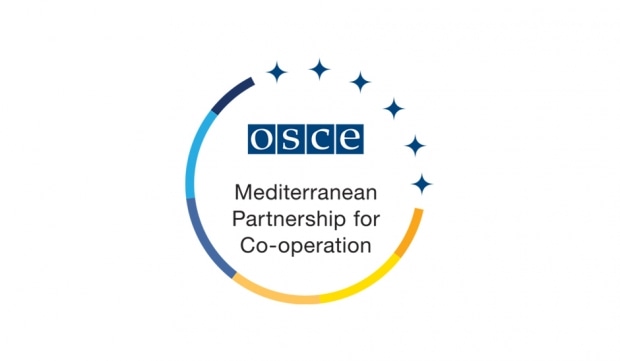VIENNA/ROME, 19 October 2017 – Representatives of the 57 OSCE participating States, the six OSCE Mediterranean Partners for Co-operation – Algeria, Egypt, Israel, Jordan, Morocco and Tunisia – and several international organizations will meet in Palermo, Italy, on 24 and 25 October to explore successful co-operative approaches to large movements of migrants and refugees across the Euro-Mediterranean region…
Email not displaying correctly? View it in your browser.
OSCE twitterOSCE FacebookOSCE Google+OSCE LinkedInOSCE SoundCloudOSCE Instagram
Logo of the OSCE Mediterranean Partners for Co-operation. (OSCE)
MEDIA ADVISORY
REMINDER: OSCE and Mediterranean partner countries will meet in Palermo, Italy, to discuss large movements of migrants and refugees
VIENNA/ROME, 19 October 2017 – Representatives of the 57 OSCE participating States, the six OSCE Mediterranean Partners for Co-operation – Algeria, Egypt, Israel, Jordan, Morocco and Tunisia – and several international organizations will meet in Palermo, Italy, on 24 and 25 October to explore successful co-operative approaches to large movements of migrants and refugees across the Euro-Mediterranean region.
Italian Minister of Foreign Affairs and International Co-operation Angelino Alfano, OSCE Chairperson-in-Office Sebastian Kurz (TBC) and OSCE Secretary General Thomas Greminger will deliver opening speeches on 24 October at 09:30 am.
In the subsequent high-level political session, the participating ministers and other high-level delegates will exchange views on advancing Mediterranean security and co-operation in an age of large movements of migrants and refugees, including security-related issues. This platform will provide an opportunity for the countries in the Mediterranean Basin and beyond to put forward ideas for turning emergencies and crises arising from migration into opportunities for renewed regional and international co-operation.
The conference will be closed by Italian Under Secretary of State for Foreign Affairs and International Co-operation, Enzo Amendola and a representative of next year’s Slovak Chairmanship of the OSCE Mediterranean Contact Group.
OSCE has been holding annual conferences with its Mediterranean Partners for Co-operation since 1995. In accordance with OSCE Convention, the Mediterranean Contact Group is chaired by the upcoming OSCE Chairmanship.
The Conference will take place at the Grand Hotel Villa Igiea, Salita Belmonte 43, Palermo, Italy.
The following events will be open to media representatives:
Monday, 23 October
Villa Chiaramonte Bordonaro ai Colli (via del Fante 64, Palermo)
15.00-16.30 – Side event “Youth, community identities and religion freedom in the Mediterranean”, with Italian Minister of Foreign Affairs and International Co-operation, Angelino Alfano
Palazzo dei Normanni (Piazza del Parlamento, 1)
13:30-17:00 – Side event entitled “Women, Peace and Security: A Gender Perspective on the Future of the MENA Region”, organized by the Track II New-Med Research Network and the 2017 Italian Chairmanship of the Mediterranean Contact Group. The discussion will focus on the importance of enhancing women’s role in the Mediterranean security context. (Sala Pio La Torre – third floor)
17:30 – Press conference of the Italian Minister of Foreign Affairs (Sala Stampa – third floor)
18:30 – Welcoming Address to Head of Delegations (Sala Piersanti Mattarella).(Photographers and Camera operators only. This event will also be livestreamed in a separate room)
Tuesday, 24 October (Grand Hotel Villa Igiea, Salita Belmonte 43)
09:00 – Arrivals of Head of Delegations (Photographers and Camera operators only)
09:30 – Opening remarks (Photographers and Camera operators only. This event will also be livestreamed in a separate room.)
12:00 – Family photo (Photographers and Camera operators only)
15:00 – Press conference of the Italian Minister of Foreign Affairs
Wednesday, 25 October
12:00 Concluding remarks (Photographers and Camera operators only. This event will also be livestreamed in a separate room.)
Media representatives who wish to attend the Conference, the side events or arrange an interview are kindly requested to apply for accreditation by 20 October, Friday, 18:00,
either:
by filling out the interactive form and clicking on the event concerned at the link http://mae.accreditationsystem.info/ENG/Indice.asp, attaching thereto, unless already provided, the documentation requested in digital format (letter from the media organization and, for representatives of foreign media, also a Note Verbale issued by the Italian Embassy in the media organization’s country).
or:
by sending an email to the Ministry of Foreign Affairs and International Co-operation’s Institutional Press and Communication Service at the following address: [email protected] (Tel. + 39 06/3691.3432 or 8573 or 8210), attaching thereto the letter from his/her media organization (or press card) and, for members of the foreign press, a Note Verbale issued by the Italian Embassy of the media organization’s country.
Due to logistic reasons, TV crews and photojournalists wanting to shoot the events may be pooled into groups, the size of which will be determined by the Press Service of the Italian Ministry of Foreign Affairs and International Cooperation.
Discussions can also be followed on Twitter at @OSCE or by using the hashtag #OSCEMed.
The agenda and more information about the event are available here.
For PDF attachments or links to sources of further information, please visit: http://www.osce.org/partners-for-cooperation/mediterranean/350851
Contacts:
Communication and Media Relations Section
Phone: + 43 676 71 74 592
[email protected]





